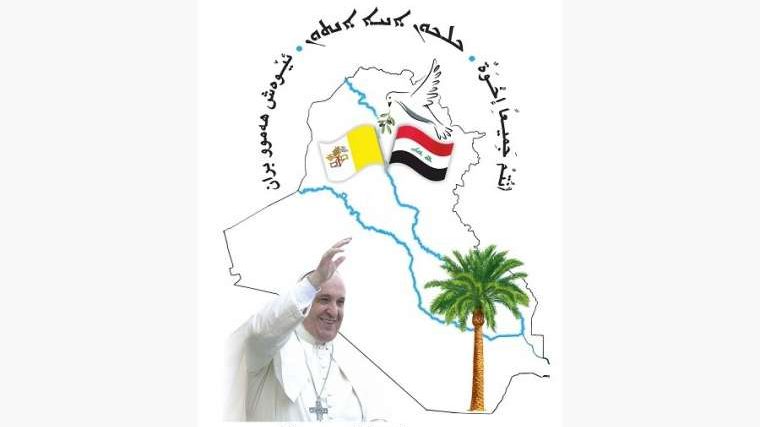More information has been released about the papal visit to Iraq, as Pope Francis expressed doubt this week about whether the trip would take place as planned in March.
In a television interview on Sunday, the pope said that he had canceled two international trips in 2020, “because in conscience I cannot cause gatherings, can I? Now I don’t know if the next trip to Iraq will take place,” he told the news program Tg5.
Meanwhile, local organizers of the visit released on Monday the logo and motto of the visit.
The logo for the trip depicts Pope Francis in front of an outline of Iraq, with the Tigris and Euphrates rivers and a palm tree. There is also a dove carrying an olive branch flying over the Vatican and Iraqi flags.
The motto -- “You are all brothers,” taken from Matthew 23:8 -- is written above in Arabic, Chaldean, and Kurdish.
The Vatican announced in December that the pope’s March 5-8 trip would include stops in Baghdad, Erbil, and Mosul.
Cardinal Louis Raphael Sako, head of the Chaldean Catholic Church, has expressed the hope that the pope will also visit Najaf, a city in central Iraq considered one of the centers of spiritual and political power for Shia Islam.
During a panel discussion on religious liberty in July 2019, Sako proposed that the Church sign a document like the Abu Dhabi document on human fraternity with Shiite leaders in Najaf.
The original peace declaration was signed by Pope Francis and a Sunni Muslim leader, Ahmed el-Tayeb, Grand Imam of al-Azhar, in the United Arab Emirates in February 2019.
If the voyage takes place as planned, Francis will be the first pope to visit Iraq, which is still recovering from the devastation inflicted by the Islamic State.
Pope Francis said in 2019 that he wanted to visit the country soon. A papal visit to Iraq has been under study by the Vatican for several years, but until recently, the country was deemed a security risk.
At the time of the December announcement, Holy See Press Office director Matteo Bruni said that the official trip schedule would be released at a later date and would “take into consideration the evolution of the worldwide health emergency.”
The pope’s visit is highly anticipated by Christians and the Iraqi authorities, who in December declared Christmas an officially recognized political holiday.
Francis is slated to visit the Christian communities in the Nineveh Plains, which were ravaged by the Islamic State from 2014 to 2016, causing many Christians to flee the region. The pope has repeatedly expressed his closeness to these persecuted Christians.
He will also go to the plain of Ur in southern Iraq, which the Bible records as the birthplace of Abraham, and the town of Qaraqosh in northern Iraq, where Christians have been working to rebuild thousands of homes and four churches damaged by the Islamic State.
One tentative schedule foresees the pope saying Mass in the Chaldean cathedral in Baghdad on March 6 and another Mass in a stadium in Erbil on March 7.
In addition to meetings with Iraqi and Kurdish civil authorities, and an encounter with Catholic clergy and religious, he is expected to attend an interreligious gathering with Christians, Jews, and Muslims in Ur.
Christianity has been present in the Nineveh Plains -- between Mosul and Iraqi Kurdistan -- since the first century AD.
While many Christians who fled the Islamic State’s onslaught in 2014 have not returned to their homes, those who did return have faced the challenge of rebuilding with hope and strength, Fr. Karam Shamasha, a Chaldean Catholic priest, told CNA in November.
Six years after the Islamic State launched its invasion, Iraq faces difficult economic problems along with the physical and psychological hurt caused by the conflict, the priest explained.
“We are trying to heal this wound created by ISIS. Our families are strong; they have defended the faith. But they need someone who says, ‘You have done very well, but you must continue your mission,’” he said.

